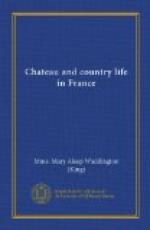It was a serious life in the big chateau. There was no railway anywhere near, and very little traffic on the highroad. After nightfall a mantle of silence seemed to settle on the house and park that absolute silence of great spaces where you almost hear your own heart beat. W. went to Paris occasionally, and usually came back by the last train, getting to the chateau at midnight. I always waited for him upstairs in my little salon, and the silence was so oppressive that the most ordinary noise—a branch blowing across a window-pane, or a piece of charred wood falling on the hearth—sounded like a cannon shot echoing through the long corridor. It was a relief when I heard the trot of his big mare at the top of the hill, quite fifteen minutes before he turned into the park gates. He has often told me how long and still the evenings and nights were during the Franco-Prussian War. He remained at the chateau all through the war with the old people. After Sedan almost the whole Prussian army passed the chateau on their way to Versailles and Paris. The big white house was seen from a long distance, so, as soon as it was dark, all the wooden shutters on the side of the highroad were shut, heavy curtains drawn, and strict orders given to have as little light as possible. He was sitting in his library one evening about dusk, waiting for the man to bring his lamp and shut the shutters, having had a trying day with the peasants, who were all frightened and nervous at the approach of the Germans. He was quite absorbed in rather melancholy reflections when he suddenly felt that someone was looking in at the window (the library was on the ground-floor, with doors and windows opening on the park). He rose quickly, going to the window, as he thought one of the village people wanted to speak to him, and was confronted by a Pickelhaube and a round German face flattened against the window-pane. He opened the window at once, and the man poured forth a torrent of German, which W. fortunately understood. While he was talking W. saw forms, their muskets and helmets showing out quite distinctly in the half-light, crossing the lawn and coming up some of the broad paths. It was a disagreeable sight, which he was destined to see many times.
It was wonderful what exact information the Germans had. They knew all the roads, all the villages and little hamlets, the big chateaux, and most of the small mills and farms. There were still traces of the German occupation when I went to that part of the country; on some of the walls and houses marks in red paint—“4 Pferde, 12 Maenner.” They generally wanted food and lodging, which they usually (not always) paid for. Wherever they found horses they took them, but M. A. and W. had sent all theirs away except one saddle-horse, which lived in a stable in the woods near the house. In Normandy, near Rouen, at my brother-in-law’s place, they had German officers and soldiers quartered for a long time. They instantly took possession




